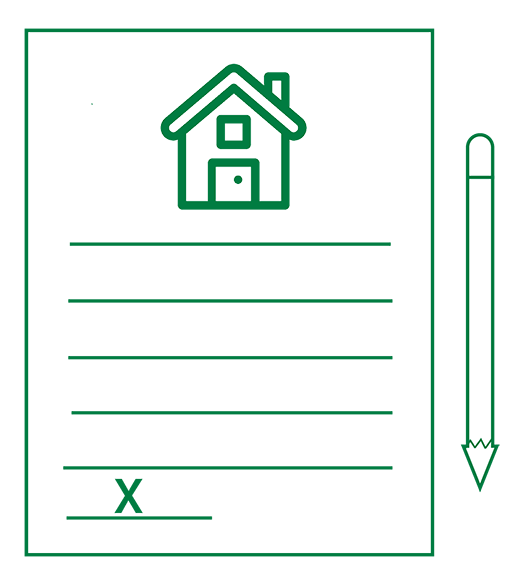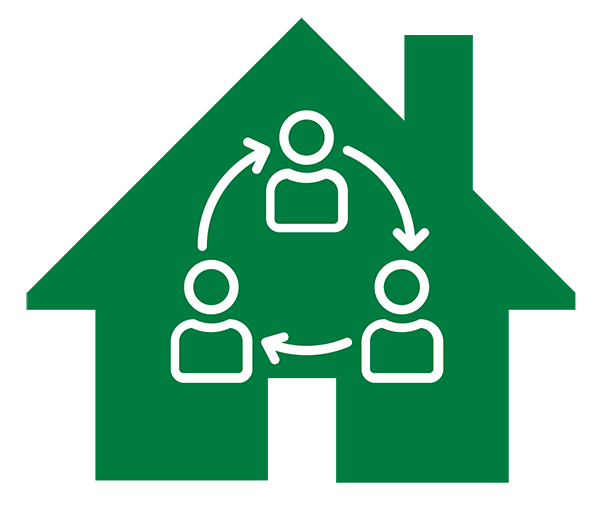Renter's Rights and Responsibilities
It's important to know your rights and responsibilities and understand to what extent you are responsible for maintaining your rental property and protecting yourself from being mischarged for any damage that might be visible when you first move in.
If you learn your rights, you will be better prepared to manage your relationship with your landlord. Please note, in owner-occupied properties, the Landlord and Tenant Act does not apply, so be sure to still have a written agreement that you mutually agree on.
What is a renter?
A Tenant, also known as a renter, is a person who occupies land or property rented from a landlord.What is a lease/tenancy agreement? 
A lease is a contract between a landlord and a tenant(s) that sets out the rules for both parties to follow. A lease is also known as a tenancy agreement and will often include information about when and why a notice can be given to end the lease.
What type of lease should I sign?
You have two different types of leases to choose from:
1) Periodic Tenancy: A lease with no end date stated. A tenant can live in the property until either the tenant or landlord gives the notice to end the tenancy. Periodic tenancies include monthly (i.e. you pay rent every month) or weekly (i.e. you pay rent every week).
2) Fixed Term lease: A tenant agrees to rent the accommodation for a fixed period of time. The end date is determined and written in the lease. Neither a tenant nor landlord can end a fixed-term lease earlier than initially agreed upon unless the other party agrees.
Read more about types of leases.
What is a damage/security deposit? 
A damage or security deposit is a one-time-only payment and cannot be more than one month's rent. A landlord asks for the deposit and the first month's rent at the same time on the first day of the month of your rental contract. The landlord must place the deposit in an interest-bearing trust account.
When your lease ends, this deposit can be used to cover any damages, cleaning, unpaid rent or utilities. If the property is left in good condition with no damage beyond normal wear and tear, and all rent and utilities are paid, then the deposit is returned in full, with interest. If deductions are made, a landlord has 10 days to provide an estimated statement of account, followed by a final statement of account within 30 days.
Can I have pets in my accommodation? 
Pet Policy
If you want to have a pet, you must first seek your landlord's permission and confirm your pet is included in the lease. A landlord may ask you to pay a pet fee for each pet. There is no set amount, and this money is non-refundable.
Read more about renting with a pet
What is an inspection report? 
An inspection report is a list of any damages in the accommodation that was apparent before moving in. It is a report signed by the tenant and the landlord together and is used to re-evaluate the apartment's condition when you move out.
Be sure to complete an inspection report before you move in. After you move out of the property, it can protect you if your landlord tries to unnecessarily deduct money from your security deposit.
What is a damage report?
If the plumbing, appliances, or any other major items break down through normal usage, the tenant should submit a written report of the problem to the landlord. Make sure to keep a copy for your records. The landlord is required to make the necessary repairs.
Download your accommodation checklist (button)
Read more about inspection/damage reports.
Notice of Rent Increase 
There is no limit on how much a landlord can increase the rent, but a landlord can only increase the rent after a year had passed from either the start of the tenancy or when the last rent increase occurred.
A landlord must give a tenant written three-month notice before a rent increase becomes effective on a monthly periodic tenancy. No notice is required to increase the rent at the end of a fixed-term agreement. There is no control over the amount of rent that can be increased.
Read more about notice of rent increase
When can the landlord enter the accommodation? 
A landlord must give 24 hours' written notice to enter the rental accommodation. The notice must state the reason for entry and the date and time of entry.
The entry must be made between 8:00 am, and 8:00 pm, except the landlord, cannot enter on a holiday or on the tenant's religious day of worship (presumed to be Sunday unless the tenant has informed the landlord, in writing, of a different day of worship).
The landlord can enter to inspect, repair, fumigate, to show prospective tenants (if you are soon moving out), purchasers or mortgages. Please note: the landlord may enter without notice during an emergency.
What are my responsibilities as a renter? 
- Pay rent on time - Most landlords prefer payment by direct deposit or e-transfer. Confirm with your landlord on their preferred method of payment. If you forget to pay your rent, you could be required to pay a late fee.
- Keep the rental clean.
- Check with your landlord and/or lease before repairing any minor damages.
- Be courteous of other tenants.
- Do not conduct any illegal business, trade or occupation.
- Follow your tenancy agreement.
- Do not change the locks without permission from the landlord.
Read more about your responsibilities
Shared Accommodation 
Sharing rental costs with others can be considerably cheaper. Remember, the person who signs the lease and utility requisitions is ultimately responsible for the payments.
Please note: The landlord-tenant act does not apply to rent a room in a private home or a basement suite without a private entrance.
Notice to Terminate Tenancy 
If you rent from month to month, your landlord must give you a three-month notice to terminate your lease unless terminated for substantial breach. A fixed-term agreement can only be terminated for substantial breach.
Once signed, the landlord and tenant must follow the conditions of the lease. Call the Landlord and Tenancy Advisory Board to ensure you understand the responsibilities and implications of your agreement.
If you have a monthly lease, a written notice must be given to the landlord on the last day of the tenancy month. For example, notice given by May 31 or June 1 ends your month-to-month lease on June 30. Pay attention to these deadlines, or you may end up staying longer than you planned or paying an extra month's rent.
Tenant Insurance 
Prepare for the Unexpected
If you plan to live off-campus, invest in tenant insurance to protect you and your possessions from unexpected risks.
Unexpected events can happen to anyone at any time - fires can start, homes are broken into, and water pipes can burst (especially when temperatures descend to -30 degrees Celsius).
Aside from replacing your damaged possessions, your landlord may hold you legally responsible for damages to your accommodations - which can be very costly if you are not protected.
Protect yourself with tenant insurance; this will protect you if you have a fire or are robbed. Ensure your insurance plan includes liability protection to replace stolen or damaged items and protect you from medical expenses if someone is hurt while visiting your home.
If you rent a place, replacing personal possessions stolen or lost in a fire is your responsibility - not your landlord's.
You may not think you own anything of high value worth insuring, but take a moment to stop and think what it would cost to replace all of your clothes, furniture and electronics if they were stolen or damaged in a fire. Fortunately, tenant insurance, covering the actual cash value or replacing your possessions, is available to renters.
What if I don't need insurance because I have credit card/ home insurance?
Make sure to double-check with your credit card or your home country insurance to ensure that you have adequate coverage.
Where can I purchase tenant insurance?
Search online using the keyword "tenant insurance Edmonton" to find a list of local insurance brokers specializing in tenant insurance. It is good to shop around for the best rates since they vary from company to company.
Read more on tenant insurance.
Utilities 


Your rental accommodations may or may not include utility fees for heating, electricity and water. If utilities are not included in your rent, you will be responsible for booking these utility services for your rental, and you will be sent a monthly bill to cover the expenses.
Monthly utility fees depend on how much gas, power or water you use. Costs can range from $50 - $150 per month for one person living in an apartment or a house.
Some rentals include the cost of heat and water in the monthly rental agreement - power is sometimes also included.
Here's a list of local utility service providers
Download and print your accommodation checklist